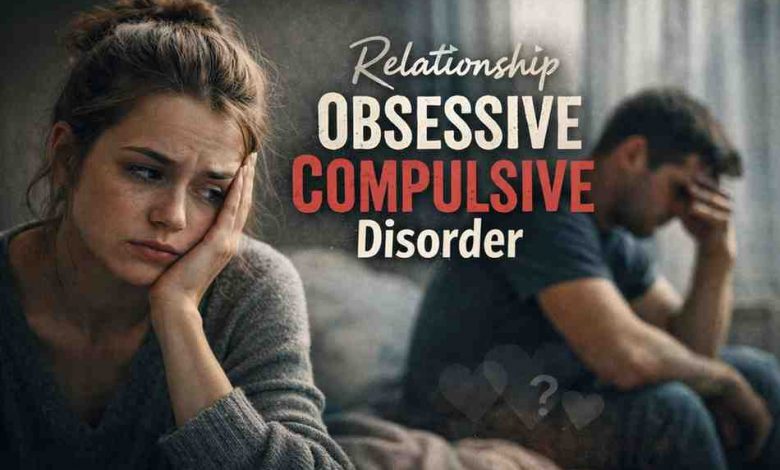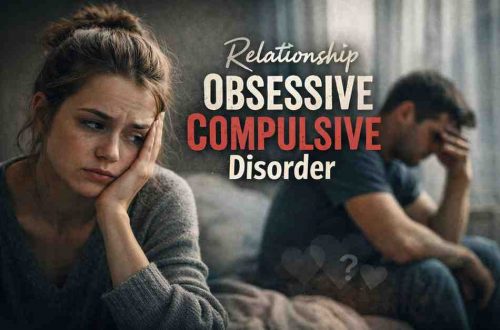

I can’t count how many late-night calls I’ve sat through where someone whispered, “What if I don’t really love them?”
Not because something terrible happened. Not because the relationship was abusive.
Just… a thought.
And then another.
And then a spiral.
From what I’ve seen, Relationship Obsessive Compulsive Disorder doesn’t show up as drama. It shows up as doubt that won’t shut up. It hijacks good relationships. It turns small moments into “evidence.” It convinces thoughtful, loyal people that they’re secretly lying to themselves.
Most of the people I’ve worked with didn’t even know there was a name for it at first.
They just thought they were broken.
If you’ve been Googling “Relationship Obsessive Compulsive Disorder” at 1:12 AM after analyzing how you felt during a hug… you’re not alone.
Let me walk you through what I’ve actually seen play out — the patterns, the mistakes, the surprising wins, and the parts no one prepares you for.
What Relationship Obsessive Compulsive Disorder Actually Looks Like in Real Life
On paper, it’s described as intrusive doubts about your relationship, your partner, or your feelings.
But that’s too clean.
In real life, it looks like:
-
Constantly checking your feelings
-
Mentally reviewing conversations for “red flags”
-
Comparing your relationship to others
-
Googling “How do you know if you’re truly in love?”
-
Confessing doubts repeatedly for reassurance
-
Feeling relief after reassurance… for about 20 minutes
Then the cycle resets.
Almost everyone I’ve seen struggle with this does this one thing wrong at first:
They treat the thought as a problem to solve.
That’s the trap.
Why People With ROCD Are Usually the Most Conscientious Ones
This surprised me after watching so many people try to “fix” it.
The ones who spiral hardest are usually:
-
Deeply moral
-
Afraid of hurting their partner
-
Hyper-responsible
-
Emotionally reflective
-
Terrified of making the wrong long-term choice
They don’t want to waste someone’s time.
They don’t want to fake love.
They don’t want to “settle.”
So when a random thought pops up —
“What if I’m not attracted enough?”
“What if there’s someone better?”
“What if this isn’t ‘the one’?”
They don’t dismiss it.
They investigate it.
And investigation feeds obsession.
The Pattern I Keep Seeing (And It’s Almost Always This)
Here’s the loop, simplified:
-
Intrusive doubt appears
-
Anxiety spikes
-
Person analyzes or seeks reassurance
-
Temporary relief
-
Brain learns: “Doubt = important. Investigate again.”
It’s reinforcement.
Not truth detection.
Most people I’ve worked with mess this up at first because they think:
“If I can just figure this out once and for all, I’ll feel calm.”
But the brain with OCD tendencies doesn’t want resolution.
It wants certainty.
And relationships don’t offer certainty.
That mismatch creates the storm.
What People Commonly Get Wrong
1. They think strong love = zero doubt
I’ve watched people in deeply healthy relationships panic because they didn’t feel fireworks 24/7.
Real relationships include:
-
Boredom
-
Irritation
-
Neutral days
-
Ambivalence
-
Attraction fluctuations
ROCD turns normal human variation into a five-alarm emergency.
2. They confuse anxiety with intuition
This is huge.
“I just feel off.”
Yes. Because you’re anxious.
Anxiety feels urgent. Intuition feels quiet.
I didn’t expect this to be such a common issue — but almost everyone confuses the two early on.
3. They over-research
Reddit threads.
Quizzes.
Attachment style breakdowns.
Compatibility charts.
The more information they consume, the more fragmented they feel.
So What Actually Works? (From What I’ve Seen)
Not perfectly. Not instantly. But consistently.
1. Exposure and Response Prevention (ERP)
I’ve watched people resist reassurance and sit with the discomfort.
It looks messy.
They’ll say:
“Maybe I don’t love them. I’m willing to live with that uncertainty.”
That sentence feels unbearable at first.
But when they stop trying to neutralize the thought, something shifts.
The thought loses power.
Not immediately.
But gradually.
2. Stopping the confession cycle
This one is brutal.
Because confessing feels honest.
But repeated confessions for reassurance often:
-
Increase partner anxiety
-
Strengthen the obsession loop
-
Create relational strain
When someone reduces reassurance-seeking by even 30%, I usually see measurable emotional improvement within weeks.
3. Accepting imperfect love
The turning point for many people wasn’t “proving” love.
It was allowing it to be imperfect.
Love that’s sometimes quiet.
Sometimes doubtful.
Sometimes ordinary.
That acceptance reduces panic.
How Long Does It Take to Feel Better?
Short answer: longer than most people want.
From what I’ve seen:
-
2–4 weeks: You feel worse before better when starting ERP
-
6–8 weeks: Anxiety spikes become shorter
-
3–6 months: Significant reduction in compulsive spirals
-
Ongoing: Maintenance and occasional flare-ups
Anyone promising a 7-day cure is selling fantasy.
Still — improvement is real. I’ve seen it repeatedly.
What If It’s Not ROCD? What If It’s a Bad Relationship?
Fair question.
Here’s the pattern difference I’ve noticed:
ROCD tends to:
-
Jump topics (attraction, compatibility, future, morality)
-
Spike during calm periods
-
Feel circular
-
Improve temporarily with reassurance
Genuinely unhealthy relationships tend to:
-
Involve consistent behavioral problems
-
Include disrespect, instability, or value misalignment
-
Trigger fear from actual events, not abstract doubt
But here’s the hard part:
You cannot solve this with 100% certainty.
And trying to will likely worsen symptoms.
Is Relationship Obsessive Compulsive Disorder Worth Treating?
Yes.
Because untreated, I’ve seen it:
-
Sabotage stable relationships
-
Create chronic guilt
-
Lead to impulsive breakups
-
Reinforce lifelong doubt cycles
That said…
It’s not easy work.
You’ll feel exposed.
Uncomfortable.
Unsure.
Who will hate this approach?
People who want guaranteed clarity.
ERP is about tolerating not knowing.
FAQ (Straight Answers)
Is Relationship Obsessive Compulsive Disorder common?
More than people realize. Especially among high-functioning, thoughtful adults.
Can you have ROCD and still truly love your partner?
Yes. In fact, that’s often the case.
Does ROCD mean you should break up?
Not automatically. Acting during peak anxiety usually backfires.
Can it go away on its own?
Sometimes symptoms reduce. But without intervention, the pattern often resurfaces in future relationships.
Objections I Hear All the Time
“I just want certainty.”
Of course you do. So does everyone.
But relationships are built on commitment, not certainty.
“If I stop analyzing, I’ll miss a red flag.”
Healthy awareness doesn’t require obsession.
“What if I’m lying to myself?”
That fear is part of the disorder loop.
Reality Check Section
Let me be honest.
This work is uncomfortable.
You will:
-
Feel doubt without fixing it
-
Resist asking for reassurance
-
Sit through anxiety waves
And your brain will scream that you’re making a mistake.
Small wins look like:
-
Not Googling for one night
-
Delaying a confession
-
Letting a doubt pass without engaging
Those matter.
I’ve seen people rebuild emotional stability one resisted compulsion at a time.
Common Mistakes That Slow Progress
-
Secretly analyzing while pretending not to
-
Switching obsessions (from love to attraction to future planning)
-
Expecting anxiety to vanish instead of shrink
-
Using mindfulness as reassurance instead of acceptance
Almost everyone slips into at least one of these.
That’s normal.
Who This Is NOT For
If you’re in:
-
An abusive relationship
-
A relationship with repeated betrayal
-
A partnership with fundamental value conflicts
Then this isn’t about tolerating doubt.
That’s discernment.
Different lane.
Practical Takeaways
If I had to boil down what consistently helps:
-
Label intrusive thoughts as noise
-
Reduce reassurance by small percentages
-
Stop seeking emotional “proof”
-
Allow imperfect feelings
-
Track progress in behavior, not emotion
Expect emotional discomfort.
Expect doubt to flare during stress.
Expect gradual, uneven progress.
Not linear.
Never linear.
I’ve watched enough people walk through Relationship Obsessive Compulsive Disorder to know this:
It feels like you’re the only one thinking these thoughts.
You’re not.
It feels like everyone else is certain.
They’re not.
It feels like doubt means doom.
It doesn’t.
So no — this isn’t magic.
But I’ve seen people who were convinced they’d never feel calm again slowly build tolerance for uncertainty. I’ve seen relationships stabilize once the obsession lost oxygen.
Sometimes the real shift isn’t proving you love someone.
It’s deciding you don’t need perfect certainty to stay.
And honestly, that’s where relief tends to begin.



